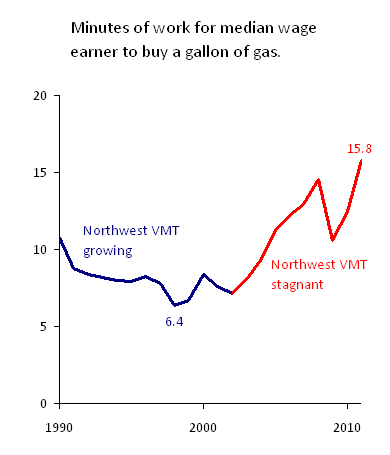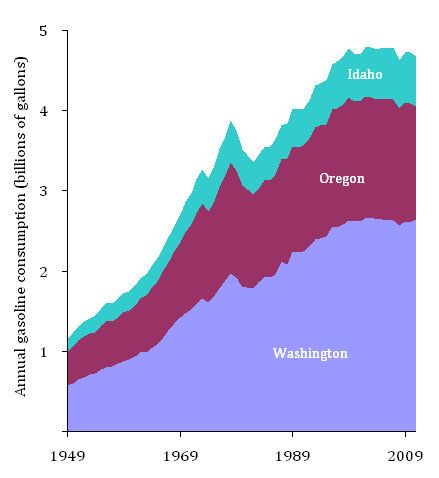The venerable Todd Litman had an interesting piece in Planetizen earlier this week, comparing gas prices with wage trends—and he found, not surprisingly, that an hour of work buys a lot less gas these days than it used to.
Here’s a chart to illustrate the recent trends… Back in 1998, it took a median wage-earner just over 6 minutes to buy a gallon of gas. In 2011, the time to buy a gallon had increased to nearly 16 minutes. Those figures combine two separate trends: the rising cost of gasoline at the pump, and the long-term stagnation and (recent declines) in real median wages.
Back in 1998, it took a median wage-earner just over 6 minutes to buy a gallon of gas. In 2011, the time to buy a gallon had increased to nearly 16 minutes. Those figures combine two separate trends: the rising cost of gasoline at the pump, and the long-term stagnation and (recent declines) in real median wages.
Apparently the combination has been enough to affect people’s relationship with their cars. As we reported earlier in the year, total miles logged on Northwest roads has barely budged since about 2002, and total gasoline consumption flatlined in the late 1990s. In fact, the most recent federal and state data confirm the trends we reported earlier in the year: with this year’s high gas prices, total fuel consumption in 2011 was actually a hair lower than it was in 1998.
 For me, the most important takeaway from the numbers is simple: drivers are responding to high prices by changing their behavior. For years, transportation planners assumed that higher gas prices would have little effect on how much people would drive. But it appears that the relationship between gas and income are powerful determinants of our appetite for driving.
For me, the most important takeaway from the numbers is simple: drivers are responding to high prices by changing their behavior. For years, transportation planners assumed that higher gas prices would have little effect on how much people would drive. But it appears that the relationship between gas and income are powerful determinants of our appetite for driving.

Comments are closed.